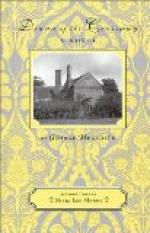His exhibition of his enemy Lord Dannisburgh, is of the class of noble portraits we see swinging over inn-portals, grossly unlike in likeness. The possibility of the man’s doing or saying this and that adumbrates the improbability: he had something of the character capable of it, too much good sense for the performance. We would think so, and still the shadow is round our thoughts. Lord Dannisburgh was a man of ministerial tact, official ability, Pagan morality; an excellent general manager, if no genius in statecraft. But he was careless of social opinion, unbuttoned, and a laugher. We know that he could be chivalrous toward women, notwithstanding the perplexities he brought on them, and this the Dorset-Diary does not show.
His chronicle is less mischievous as regards Mrs. Warwick than the paragraphs of Perry Wilkinson, a gossip presenting an image of perpetual chatter, like the waxen-faced street advertizements of light and easy dentistry. He has no belief, no disbelief; names the pro-party and the con; recites the case, and discreetly, over-discreetly; and pictures the trial, tells the list of witnesses, records the verdict: so the case went, and some thought one thing, some another thing: only it is reported for positive that a miniature of the incriminated lady was cleverly smuggled over to the jury, and juries sitting upon these eases, ever since their bedazzlement by Phryne, as you know . . . . And then he relates an anecdote of the husband, said to have been not a bad fellow before he married his Diana; and the naming of the Goddess reminds him that the second person in the indictment is now everywhere called ’The elderly shepherd’;—but immediately




